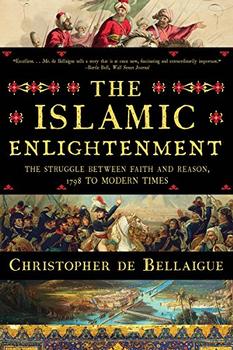Summary | Excerpt | Reviews | Beyond the Book | Readalikes | Genres & Themes | Author Bio
The Struggle Between Faith and Reason, 1798 to Modern Times

Critics' Opinion:
Readers' Opinion:
First Published:
Apr 2017, 432 pages
Paperback:
Aug 2018, 432 pages
 Book Reviewed by:
Book Reviewed by:
Lisa Butts
Buy This Book
This is the civilisation of Islam. How would this civilisation have dealt with Jane Eyre and the vistas of personal fulfillment preventing her from closing her eyes at night? Would it approve or wrinkle its nose? Would Islam 'get' Jane Eyre?
Were I able to answer this question in the affirmative, it is likely that you would not be holding this book, or you would be holding a very different book. Islamic civilisation in the first decades of the nineteenth century would neither have appreciated nor understood Jane Eyre, because it hadn't the wherewithal to do so.
First consider the vehicle by which Muslim audiences would have met her: the printed book. This would have been a non-starter at the time in which Jane Eyre is set, because almost four centuries after Gutenberg revolutionised intellectual and religious life in Europe with the invention of movable type, the printing press continued to be regarded by Islam as an unwelcome and alien innovation, and had not been admitted to general use. Then there was the matter of translating Brontë's prose into the local languages. The number of Turkish, Arabic and Persian speakers who knew good English was minuscule and there was no market in the Middle East for translated works from abroad.
Even if these constraints had been somehow overcome, and the trusty copyists were induced to inscribe large quantities of a translated Jane Eyre, audiences would have remained tiny for another reason. The latest scholarship puts the literacy rate in Turkey, Egypt and Iran – the three most important intellectual and political points in the region – at roughly 3 per cent at the turn of the nineteenth century, compared to more than 68 per cent for men and 43 per cent for women in England. In Amsterdam, the world's capital of literacy at the time, the figures were 85 per cent and 64 per cent respectively. There can be no reading public when no one can read.
Still, ploughing doggedly on, supposing we could wave aside these considerations and imagine that through public storytellers large numbers of Muslims were exposed to the life and times of Jane Eyre, what would their reaction have been? The notion of newspapers and a postal service would have caused bemusement in lands where neither existed, no less than the fantasy of wheeled traffic between towns. Then there was the moral Pandora's box opened by Jane's behaviour. It was scandalous that a heroine should gad about the country without a chaperone, fall in love with one man, attract the attentions of another – and after this wanton display be presented by the author as a model of virtue.
The very systems of society were completely different in Jane's England: where was the harem, the protected, female-only sanctum within the family, and why did Mr Rochester not have slaves? And don't even mention Mr Rochester's dissipated female guests at Thornfield Hall, playing airs on the fortepiano and riding horses and showing off their bosom and long flowing hair.
Perhaps the kindest thing that could have been said about the plot of Jane Eyre is that it illustrated the superiority of Muslim doctrine. Under Muslim law Mr Rochester would have been able to take Jane as his second wife (being permitted a maximum of four) and he would have been able to save what remained of her virtue without all that nonsense about the madwoman in the attic.
In short, from the perspective of a Muslim at the beginning of the nineteenth century, the character of Jane Eyre was a rank impossibility accessible to almost no one and the story of her life so preposterous as to approach derangement.
*
With the invention of the steamship, possible destinations multiplied in number. Getting around became easier. Following that, with railways, travel became easier still. In the same way that travel was accelerated through this means, so was communication, by means of the telegraph. News that would have taken a year to arrive from a distant land now took an hour. The world was poured into a different mould.
Excerpted from The Islamic Enlightenment by Christopher de Bellaigue. Copyright © 2017 by Christopher de Bellaigue. With permission of the publisher, Liveright Publishing Corporation. All rights reserved.




In war there are no unwounded soldiers
Click Here to find out who said this, as well as discovering other famous literary quotes!
Your guide toexceptional books
BookBrowse seeks out and recommends the best in contemporary fiction and nonfiction—books that not only engage and entertain but also deepen our understanding of ourselves and the world around us.